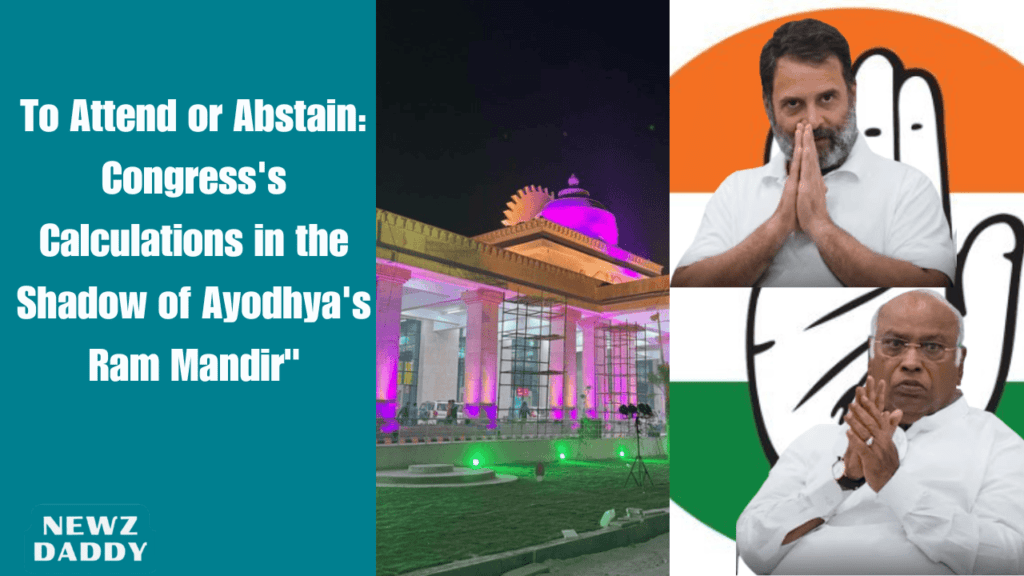Last updated on January 27th, 2024 at 08:00 am
To Attend or Abstain: Congress’s Calculations in the Shadow of Ayodhya’s Ram Mandir
Newzdaddy Political Updates
In the run-up to the Ayodhya Ram Temple Pran Pratishtha scheduled for January 22, the Congress finds itself at a crossroads, deciding to skip the event organized by the Rashtriya Swayamsevak Sangh (RSS) and Bharatiya Janata Party (BJP). As the BJP capitalizes on the Ram Mandir issue, the Congress grapples with the question: will this strategic move lead to electoral setbacks in the looming Lok Sabha elections?
The Congress, while abstaining from the inauguration, has raised concerns about the rushed proceedings, emphasizing that the temple construction remains incomplete. By opting out of the event, the party aims to distance itself from what it sees as political posturing by its opponents. This decision, however, is not without its internal debates, with leaders contemplating the potential consequences of their absence.
BJP’s Ram Mandir Agenda
With the BJP gearing up to leverage the Ram Mandir as a prominent electoral issue, the Congress’s decision assumes significance. The saffron party’s association with the Ayodhya temple holds emotional resonance for many voters, making it a potent tool in electoral politics. The Congress, by choosing not to participate, risks ceding ground to the BJP in the battle for public sentiment.
The Congress finds itself in the company of other opposition parties, such as the Trinamool Congress (TMC) and the Left, in skipping the event. This unified front shares a common concern about the timing of the inauguration, especially in the lead-up to the crucial Lok Sabha elections. The fear is that the BJP might capitalize on the religious sentiments associated with the temple, creating an electoral disadvantage for the opposition.
TMC’s Historical Perspective
Mamata Banerjee, the chief of the TMC, draws from the West Bengal experience during the state polls, where the ‘Jai Shri Ram’ slogan failed to resonate with voters. Banerjee’s decision to skip the Ayodhya event is rooted in the belief that the religious fervour associated with the temple may not significantly impact her electoral fortunes in the upcoming 2024 Lok Sabha polls.
Potential Ram Mandir Impact on Minority Votes
The Congress, by steering clear of the Ayodhya inauguration, aims to avoid the risk of alienating minority voters. The party’s leaders recognize that the BJP holds a strong Hindutva image, making any attempt to compete on these grounds a challenging proposition. Balancing the appeal to the majority sentiment while safeguarding minority support remains a delicate challenge for Congress.
Within Congress, the decision to skip the event has sparked internal debates. Leaders from Uttar Pradesh, a key battleground state, have sought clarity on the party’s stance, expressing concerns about potential electoral repercussions. Despite the official party line, some leaders from the state have chosen to attend the Ayodhya ceremony, highlighting the internal divisions within the Congress.
To understand the gravity of the Congress’s decision, it’s crucial to delve into the historical context of the Ayodhya dispute. The Ram Janmabhoomi-Babri Masjid issue has been a longstanding point of contention, shaping the political landscape for decades. The construction of the Ram Mandir has been a central promise for the BJP, and the inauguration holds immense symbolic value for its supporters.
Public Perception and Political Strategy
The Congress’s dilemma reflects the intricate dynamics of Indian politics, where symbolism and sentiment often play a pivotal role. The decision to skip the Ayodhya event is not merely a matter of attendance but a strategic move to navigate the complex web of religious, cultural, and political sentiments that define Indian elections.
Potential Ram Mandir Electoral Impact
As the Congress weighs the potential electoral impact of its decision, the party leadership confronts the challenge of striking a delicate balance. While avoiding the Ayodhya event may shield the party from certain pitfalls, it also raises questions about its ability to connect with voters on issues of cultural and religious significance.
In the digital age, social media has become a battleground for political narratives. The Congress’s decision and the subsequent reactions are likely to reverberate online, influencing public opinion and contributing to the broader discourse surrounding the Ayodhya temple inauguration. Social media platforms are increasingly becoming instrumental in shaping electoral outcomes.
As the political landscape in India evolves in the lead-up to the Lok Sabha elections, the Congress’s stance on the Ayodhya Ram Temple Pran Pratishtha emerges as a defining moment. Balancing the intricacies of cultural sentiments, electoral calculations, and internal party dynamics, the Congress faces a challenging path ahead.

